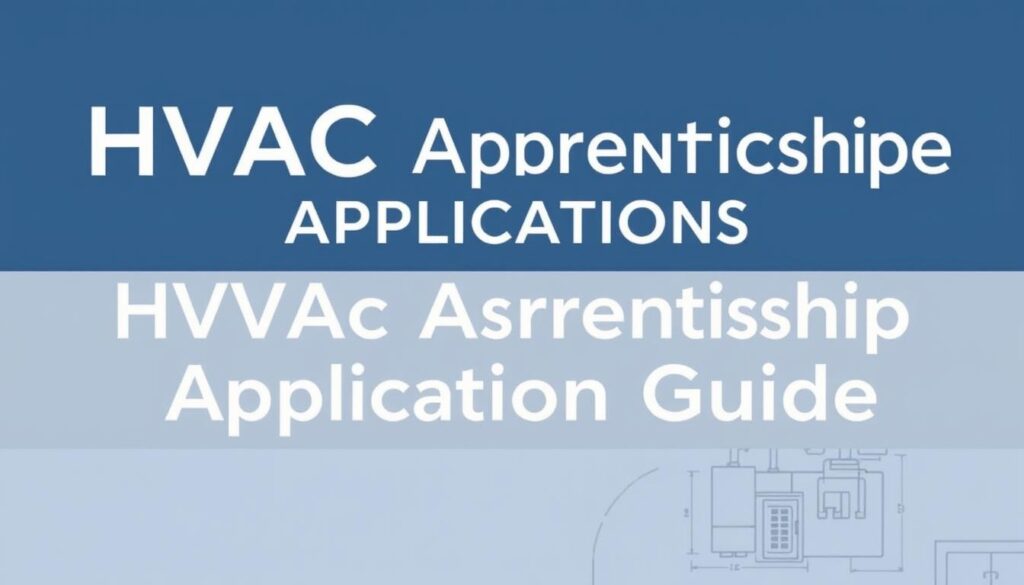How to Apply for HVAC Apprenticeship? Are you ready to start a career that’s both technical and rewarding? Becoming an HVAC technician could be your ticket to a stable future. It’s a path that combines skills, hands-on training, and great pay.

HVAC apprenticeships are a great way to enter a dynamic technical field. They offer comprehensive training. This training prepares you for a career in heating, ventilation, and air conditioning.
Applying for HVAC apprenticeships might seem hard, but this guide makes it easy. It’s perfect for recent graduates or those looking for a new career. Learning about HVAC apprenticeships can kickstart your professional journey.
Key Takeaways
- HVAC apprenticeships combine classroom learning with practical training
- Multiple pathways exist for entering HVAC apprenticeship programs
- Technical skills and physical fitness are crucial for success
- Apprenticeships offer competitive wages and career growth opportunities
- Both union and non-union training options are available nationwide
Table of Contents
Understanding HVAC Apprenticeship Basics
Starting a career in heating, ventilation, and air conditioning (HVAC) begins with apprenticeships. These programs offer a structured way to learn the trade. They help you become a skilled technician in the HVAC field.
What is an HVAC Apprenticeship?
An HVAC apprenticeship is a training program that mixes work experience with classroom learning. When you apply, you’ll learn important skills from seasoned professionals. This approach is key to your success.
- Combines hands-on training with technical education
- Typically lasts 4-5 years
- Provides paid on-the-job learning opportunities
Benefits of Becoming an HVAC Apprentice
Apprenticeships offer many benefits for your career. They help you meet HVAC certification requirements. This sets a strong foundation for your future in the field.
- Earn while you learn
- Gain practical industry experience
- Receive professional mentorship
- Develop specialized technical skills
Types of HVAC Apprenticeship Programs
There are various apprenticeship programs to fit different career goals. Knowing about these options helps you pick the right one for you.
| Program Type | Duration | Key Characteristics |
|---|---|---|
| Union-Sponsored | 4-5 years | Structured curriculum, strong job placement |
| Employer-Sponsored | 3-4 years | Company-specific training, potential job guarantee |
| Community College | 2-3 years | Academic credits, flexible scheduling |
Exploring these apprenticeship options prepares you for a fulfilling HVAC career. You’ll gain essential skills and professional credentials.
Explore Our HVAC Shop
Looking for top-rated HVAC tools, parts, and accessories? Visit our shop and find the perfect solution for your needs.
Visit the ShopEssential Requirements for HVAC Apprenticeship
Starting a career in HVAC needs you to meet certain basics. These show you’re ready for the technical world of HVAC. Knowing what’s needed helps you apply well for HVAC jobs and meet certification requirements.
Educational Prerequisites
Your education is key to getting into an HVAC apprenticeship. Most programs ask for:
- High school diploma or equivalent GED
- Minimum age of 18 years
- Basic math and algebra skills
- High school physics or technical courses
Physical Requirements and Skills
HVAC techs need certain physical skills and traits to do well. Important skills include:
- Strong manual dexterity
- Physical stamina for lifting
- Comfort in different environments
- Good problem-solving and thinking
Documentation Needed
Getting your application ready means collecting important documents. You’ll need:
- Official high school transcripts
- Government-issued photo ID
- Proof of age
- Academic records
- Any technical certifications
Pro tip: Always check the specific needs of each apprenticeship program. Requirements can differ.
How to Apply for HVAC Apprenticeship
Starting your HVAC career involves a few key steps. First, you need to understand how to apply for an apprenticeship. This is the first step towards becoming a skilled HVAC technician.
To find apprenticeships, start by looking locally. Here are some places to check:
- Local union halls
- HVAC contractor websites
- State workforce development centers
- Professional HVAC associations
When you apply, make sure your application stands out. Include:
- High school diploma or equivalent
- Basic math and science skills
- Physical fitness documentation
- Professional references
| Application Component | Key Requirements |
|---|---|
| Resume | Emphasize technical skills, relevant coursework |
| Cover Letter | Express passion for HVAC industry, career goals |
| Interview Preparation | Research company, practice technical questions |
Networking is also important. Go to job fairs, meet HVAC professionals, and show you’re eager to learn.
Pro tip: Many apprenticeships are competitive. Apply early and follow up with employers.
Explore Our HVAC Shop
Looking for top-rated HVAC tools, parts, and accessories? Visit our shop and find the perfect solution for your needs.
Visit the ShopUnion vs Non-Union HVAC Apprenticeships
Choosing between union and non-union HVAC apprenticeships can greatly affect your career. Both paths offer unique chances to grow as an HVAC technician. They help you build a successful career in the field.
When looking at paid HVAC apprenticeships, you’ll find two main paths: union and non-union. Each has its own benefits and challenges that can influence your career.
Understanding Union HVAC Apprenticeships
Union HVAC apprenticeships offer a structured way to grow professionally. These programs usually include:
- Standardized training curriculum
- Consistent wage scales
- Comprehensive job placement assistance
- Strong collective bargaining power
Exploring Non-Union Training Opportunities
Non-union apprenticeships offer different paths for HVAC professionals. These programs often have:
- Greater flexibility in training
- Potential for faster career advancement
- More diverse learning environments
- Individual negotiation opportunities
Comparing Key Considerations
When deciding between union and non-union apprenticeships, consider several key factors:
| Factor | Union Apprenticeships | Non-Union Apprenticeships |
|---|---|---|
| Job Security | High | Variable |
| Wage Potential | Standardized | Negotiable |
| Training Quality | Consistent | Depends on Employer |
Ultimately, your career goals and personal preferences will guide your choice between union and non-union HVAC apprenticeships.
HVAC Apprenticeship Training Structure
Understanding hvac apprenticeship programs is key. Your path to becoming an HVAC technician is well-planned. It mixes hands-on experience with classroom learning.
Training usually lasts 3-5 years. You’ll spend time both on the job and in class. This mix helps you learn both skills and theory needed in HVAC.
- Total Training Duration: 3-5 years
- On-the-Job Training: Approximately 8,280 hours
- Classroom Instruction: Around 720 hours
Your apprenticeship has different stages:
- Entry-Level Helper: You learn basic skills and safety first.
- Advanced Apprentice: You get better at technical skills.
- Journeyman: You show you’re a pro with all skills.
“An HVAC apprenticeship is not just a job – it’s a comprehensive professional development journey.” – HVAC Industry Expert
Mentorship is vital in your training. Working with experienced techs gives you real-world insights. It prepares you for HVAC’s challenges.
Explore Our HVAC Shop
Looking for top-rated HVAC tools, parts, and accessories? Visit our shop and find the perfect solution for your needs.
Visit the ShopClassroom Training and Technical Education Components
Your HVAC apprenticeship journey includes rigorous classroom training. This phase transforms you from a novice to a skilled professional. It covers essential technical knowledge needed for HVAC certification.

In your technical education, you’ll learn through comprehensive learning modules. These modules are designed to prepare you for real-world HVAC challenges. The program spans 720 hours, ensuring you gain deep expertise.
Core Curriculum Overview
The curriculum for HVAC school admission focuses on key areas. It builds your technical proficiency in:
- HVAC system design principles
- Electrical systems and controls
- Refrigeration fundamentals
- Advanced thermodynamics
- Safety protocols and industry regulations
Required Certifications
Your training will help you get crucial industry certifications. These include:
- EPA Section 608 Certification
- NATE (North American Technician Excellence) Certification
- OSHA Safety Certifications
“Continuous learning is the key to mastering HVAC technologies.” – HVAC Industry Expert
Testing and Assessment Methods
Your progress will be checked through various methods:
- Written examinations testing theoretical knowledge
- Practical skills demonstrations
- Performance-based assessments
- Hands-on laboratory experiments
These training components ensure you’re ready to excel in the HVAC industry. They transform technical education into practical expertise.
Explore Our HVAC Shop
Looking for top-rated HVAC tools, parts, and accessories? Visit our shop and find the perfect solution for your needs.
Visit the ShopOn-the-Job Training Experience
Being an apprentice HVAC installer means you’re at the heart of learning. Paid HVAC apprenticeships last about 8,280 hours. This hands-on time turns book knowledge into real skills.
You’ll see many HVAC systems and face real challenges. You’ll work with seasoned technicians who will help you grow. They’ll teach you both technical and people skills.
- Learn how to install HVAC systems for homes and businesses
- Practice safety and follow the best practices in the field
- Improve your problem-solving in real-world situations
- Get familiar with the latest diagnostic and repair tools
As you get better, you’ll take on bigger tasks. First, you might help senior technicians, get sites ready, and help with equipment upkeep. Then, you’ll do more on your own, like installing and fixing systems.
“Every challenge is an opportunity to learn and grow in your HVAC career.” – Professional HVAC Training Association
Important skills you’ll learn include customer service, teamwork, precision, and being flexible. Your mentors will teach you about HVAC tech, but also how to communicate well and keep customers happy.
By the end of your apprenticeship, you’ll be a skilled HVAC installer. You’ll be ready to handle tough HVAC jobs.
Compensation and Benefits During Apprenticeship

Starting a paid hvac apprenticeship is a great way to kick off your hvac technician career. You’ll get good pay and lots of benefits. Knowing what you’ll earn helps you plan your career.
Starting Wages for Apprentices
At the start, apprentices make 30% to 50% of what a fully licensed tech makes. As you learn more, your pay goes up.
- Entry-level apprentices usually earn between $14-$20 per hour
- Wages vary by location, employer, and apprenticeship program type
- Union apprenticeships often provide more consistent pay scales
Wage Progression
Your pay will increase a lot as you work. Most programs have a plan to raise your wages as you get better:
- First-year apprentices: 30-40% of journeyman rate
- Second-year apprentices: 50-60% of journeyman rate
- Third-year apprentices: 65-75% of journeyman rate
- Fourth-year apprentices: 80-90% of journeyman rate
Additional Benefits Package
Many apprenticeships offer more than just pay. You’ll get great benefits too:
- Health insurance coverage
- Retirement plan options
- Paid technical training
- Potential overtime opportunities
- Tool allowance or reimbursement
Your journey as an hvac technician begins with a strong apprenticeship. It offers top-notch training and good pay for your growing skills.
Explore Our HVAC Shop
Looking for top-rated HVAC tools, parts, and accessories? Visit our shop and find the perfect solution for your needs.
Visit the ShopCareer Advancement After Apprenticeship
Finishing your HVAC apprenticeship opens up many career doors. Your path in the HVAC field can lead to growth and better pay. As a certified journeyman, you can explore various roles in the HVAC world.
There are many career paths for skilled HVAC professionals:
- Commercial HVAC Systems Specialist
- Industrial Refrigeration Technician
- Energy Efficiency Consultant
- Building Automation Systems Expert
Starting with entry-level hvac jobs can lead to bigger roles with the right planning. Here are some career moves to consider:
- Lead Technician
- Service Department Supervisor
- Project Manager
- HVAC Design Engineer
| Career Stage | Potential Earnings | Required Skills |
|---|---|---|
| Journeyman Technician | $55,000 – $75,000 | Technical expertise, problem-solving |
| Service Manager | $80,000 – $100,000 | Leadership, communication, technical knowledge |
| Business Owner | $100,000+ | Entrepreneurship, business management |
Keep learning to move up in your HVAC career. Stay current with new tech, get more certifications, and network. This will help you grow professionally.
Invest in yourself, and the HVAC industry will reward your dedication and skill development.
Conclusion
Starting an HVAC apprenticeship is a smart move for a rewarding career in heating, ventilation, and air conditioning. To apply, you need to prepare well, know what the program requires, and show you’re serious about growing professionally.
The HVAC technician career is full of chances for those who love technical work and solving problems. By looking into apprenticeships, meeting the educational needs, and gaining key skills, you set yourself up for success. This field is growing fast and needs skilled people.
With more HVAC technicians needed in the U.S., it’s a great time to move forward with your career plans. Whether you go for a union or non-union apprenticeship, your hard work and smart planning will help you succeed.
It’s time to act: look for apprenticeships in your area, get your application ready, and talk to industry experts for advice. With determination and the right preparation, you can make your dream of becoming an HVAC technician a reality.

